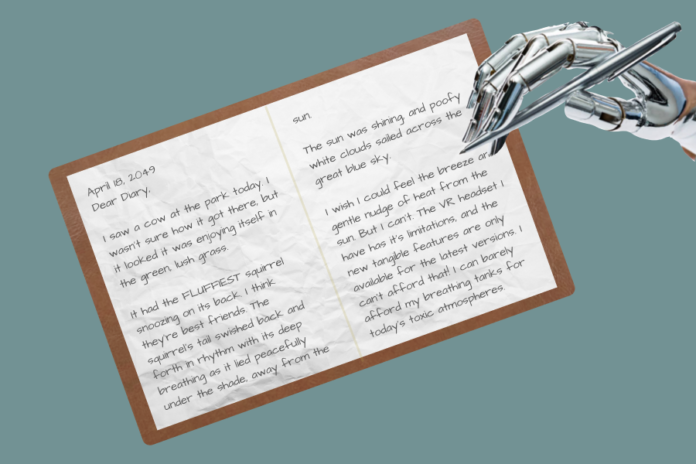Everyone should give expressive writing a try
By OWEN RUDERMAN — opruderman@ucdavis.edu
I’m willing to bet that most students at UC Davis write on a daily basis. Texts, academic papers and discussion posts are a few of the most common forms of writing for us. But those are all for school or for other people. When was the last time you wrote for yourself?
In the past, I’ve attempted to keep a journal. I tried to write by hand in a little notebook or to keep my feelings on a Google Doc. I even tried to record myself talking as a way of cataloging my thoughts. But none of it stuck.
This quarter, I started to keep a journal again, and I’ve finally figured out the trick: Just write. I know that sounds obvious, but in the past I had specific expectations about what sort of things I was supposed to write about, and for how long, and when and where. I realized that the content of your journal can be about anything. It can be as much or as little as you want. It can be composed at any time of the day, and it can even be revisited only once or twice a week. At the end of the day, there is no word count requirement for your journal, no deadlines. It’s just for you.
As I wrote in my journal, I began to notice a subtle shift in the way I viewed myself. Now that my thoughts were more organized and I could read them over, I began to know myself better. Journaling has allowed me to think more clearly about my stresses and issues.
I also began to develop healthier habits with writing. Now that I have rid my mind of all expectations about what journaling is, I am free to do whatever I want with it. Whenever something pops into my head that seems like an insight into myself, I quickly write it down in my notes app. I’m more in touch with myself than before, and it’s only been a few weeks.
Additionally, I’m getting the opportunity to flesh out my creative side. Before I started my journal, thoughts would come and go throughout the day without much of a filter. I had no interest in catching the good ones and storing them away for further use. But now that I’ve begun to listen to myself more, it’s easier to come up with ideas for various stories and projects.
For some, the journal might become more like a diary. For others, it may become an incubator for ideas. For others still, it may look like a fusion of both or something entirely different. There are no downsides, no judgment. It’s just a risk-free way of talking to and getting to know yourself.
There are a lot of stresses and anxieties that come along with college life. We aren’t sure what we’re doing or what the future holds, confusing things happen, classes are hard and sometimes it feels like everything is falling apart. I truly believe that keeping a journal can help one work through these feelings.
But don’t take my word for it. Expressive writing can quite literally heal you, according to a study. This research suggests that writing about emotions and stress can boost your immune system. Another study states that expressive writing can boost your IQ and self-confidence.
I can’t recommend journaling enough. Next time you feel like you just need to vent, consider picking up a pad of paper or opening your notes app. Remember: Just write.
Written by: Owen Ruderman — opruderman@ucdavis.edu
Disclaimer: The views and opinions expressed by individual columnists belong to the columnists alone and do not necessarily indicate the views and opinions held by The California Aggie.





